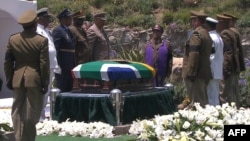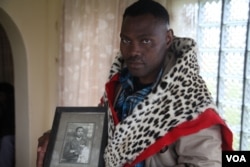QUNU, SOUTH AFRICA —
Driving through South Africa's Eastern Cape to Qunu was like being in a constant carwash, with five days of sheet-like rain turning asphalt into puddles and dirt roads into rivers. The local people attributed this highly unseasonal and stupendous amount of water to Nelson Mandela's death, as in his Xhosa culture rains before a funeral mean the heavens are preparing to greet a great man.
Others on a journey spanning more than 700 kilometers south from Johannesburg said that the gods were crying. Their tears were so great that a chocolate-colored river almost touched the bridge that links the village of Mqhekewenzi, where Mandela's adoptive Thembu royal family live, to the rest of the world.
The Thembu King took in the future president at age nine, after his father died, and nicknamed him “Tatomkhalu,” or grandfather. Mandela became just that to the king's grandson, Chief Zanomthetho Mtirara. The chief promised this week that as soon as Mandela's body was brought back to his boyhood village of Qunu, the driving rains that rendered umbrellas and mascara so useless would clear up.
“You wait, on Saturday the weather will change and it will be beautiful,” he said.
And he was right. The sun beamed down on an almost cloudless Qunu. Sodden sheep scattered themselves across the hilltops as Mandela's coffin, flanked by police motorbikes and followed by an array of large military vehicles, arrived at his modern house perched atop a hillside otherwise full of small conical homes.
After a week of dismal weather ruining photos, on Sunday the small village literally glowed, and faces beamed as people mourned the father of the rainbow nation.
One of eight gunners chosen to fire the 21-gun salute at Mandela's gravesite, Lance Bombadier Fumani Bulebesi, was bright and sunny despite having been up since 2 a.m. to guard the site next to the funeral tent.
She remembers the call coming in to ask her to take part in Mandela's send off. "It was a good feeling. He was a hero and he is still a hero for us,” she said.
Her colleague Captain Tozuma Mali had a premonition that she would get sent to Qunu to fire the guns, but said she would have come anyway. “I am who I am today because of this man. Because he made the change. Long live the spirit of Nelson Mandela,” she said.
Dickson Gangatele, 71, chose to watch the funeral on TV as his eyesight was too poor to join the rest of Qunu's residents, who had turned out to try to sneak a glimpse of the proceedings in a large white tent in a field hundreds of meters away.
He recalls a conversation he had with Mandela in 1995, soon after the end of apartheid.
“When you went to Robben Island we thought you would give up. We thought Nelson Mandela was wasting his time. These whites were never going to go. But you did not give up, you were a strong man," he says he told the late president. "And he shook my hand and smiled.”
For his daughter Weziwe Gangatale, the fact that none of Qunu's residents could take part in Sunday's funeral was “strange” for a man who used to hand out Christmas presents to the local children at his home on top of the hill.
“Mandela was living with us all these years, and we are not even in the funeral. It was too controlled and people here say it is the government's fault,” she said.
Mandela's death attracted dignitaries from across the globe, but also many ordinary South Africans like Pumane Ngocwane, who drove for 12 hours to be in Qunu.
“My neighbors, when I told them I was going to Qunu, said that I would not see anything. But here I am talking to people from all over the world,” she said, wearing a dress she had made especially for the event.
“I did not want to watch this on TV. I wanted to see things live. I wanted to put my foot in Qunu and feel the soil,” she said.
A four-person band named after Mandela's clan, “The Madiba Beat Crew” had been dancing from the wee hours outside his home in Johannesburg's upscale Houghton district when VOA met them nine days ago. They used all their profits from selling Mandela memorabilia to get to Qunu in their home state, as in Xhosa culture, you have to pay your respects to a great man in person; the TV does not suffice.
“Now we have no money for fuel to get back,” said singer Thandie Bushala, with a wide grin on her face as she stomped out another Mandela tribute just meters from his home.
For the moment, she dances in the sun - a sign, perhaps that Madiba is now in heaven and is looking down on his village and his nation as they begin to learn how to get along without him.
Others on a journey spanning more than 700 kilometers south from Johannesburg said that the gods were crying. Their tears were so great that a chocolate-colored river almost touched the bridge that links the village of Mqhekewenzi, where Mandela's adoptive Thembu royal family live, to the rest of the world.
The Thembu King took in the future president at age nine, after his father died, and nicknamed him “Tatomkhalu,” or grandfather. Mandela became just that to the king's grandson, Chief Zanomthetho Mtirara. The chief promised this week that as soon as Mandela's body was brought back to his boyhood village of Qunu, the driving rains that rendered umbrellas and mascara so useless would clear up.
“You wait, on Saturday the weather will change and it will be beautiful,” he said.
And he was right. The sun beamed down on an almost cloudless Qunu. Sodden sheep scattered themselves across the hilltops as Mandela's coffin, flanked by police motorbikes and followed by an array of large military vehicles, arrived at his modern house perched atop a hillside otherwise full of small conical homes.
After a week of dismal weather ruining photos, on Sunday the small village literally glowed, and faces beamed as people mourned the father of the rainbow nation.
One of eight gunners chosen to fire the 21-gun salute at Mandela's gravesite, Lance Bombadier Fumani Bulebesi, was bright and sunny despite having been up since 2 a.m. to guard the site next to the funeral tent.
She remembers the call coming in to ask her to take part in Mandela's send off. "It was a good feeling. He was a hero and he is still a hero for us,” she said.
Her colleague Captain Tozuma Mali had a premonition that she would get sent to Qunu to fire the guns, but said she would have come anyway. “I am who I am today because of this man. Because he made the change. Long live the spirit of Nelson Mandela,” she said.
Dickson Gangatele, 71, chose to watch the funeral on TV as his eyesight was too poor to join the rest of Qunu's residents, who had turned out to try to sneak a glimpse of the proceedings in a large white tent in a field hundreds of meters away.
He recalls a conversation he had with Mandela in 1995, soon after the end of apartheid.
“When you went to Robben Island we thought you would give up. We thought Nelson Mandela was wasting his time. These whites were never going to go. But you did not give up, you were a strong man," he says he told the late president. "And he shook my hand and smiled.”
For his daughter Weziwe Gangatale, the fact that none of Qunu's residents could take part in Sunday's funeral was “strange” for a man who used to hand out Christmas presents to the local children at his home on top of the hill.
“Mandela was living with us all these years, and we are not even in the funeral. It was too controlled and people here say it is the government's fault,” she said.
Mandela's death attracted dignitaries from across the globe, but also many ordinary South Africans like Pumane Ngocwane, who drove for 12 hours to be in Qunu.
“My neighbors, when I told them I was going to Qunu, said that I would not see anything. But here I am talking to people from all over the world,” she said, wearing a dress she had made especially for the event.
“I did not want to watch this on TV. I wanted to see things live. I wanted to put my foot in Qunu and feel the soil,” she said.
A four-person band named after Mandela's clan, “The Madiba Beat Crew” had been dancing from the wee hours outside his home in Johannesburg's upscale Houghton district when VOA met them nine days ago. They used all their profits from selling Mandela memorabilia to get to Qunu in their home state, as in Xhosa culture, you have to pay your respects to a great man in person; the TV does not suffice.
“Now we have no money for fuel to get back,” said singer Thandie Bushala, with a wide grin on her face as she stomped out another Mandela tribute just meters from his home.
For the moment, she dances in the sun - a sign, perhaps that Madiba is now in heaven and is looking down on his village and his nation as they begin to learn how to get along without him.






